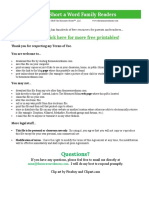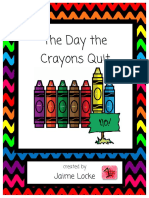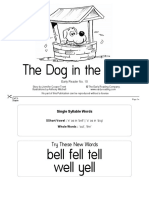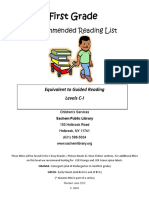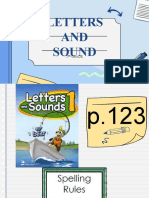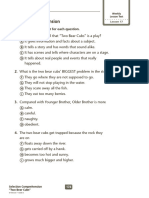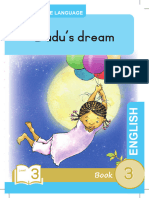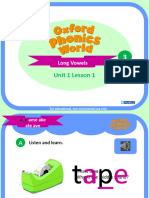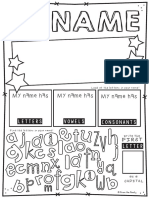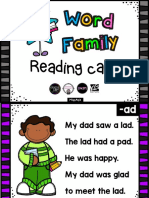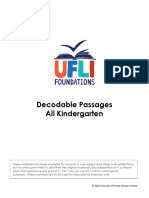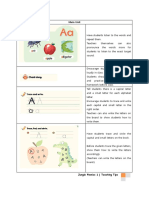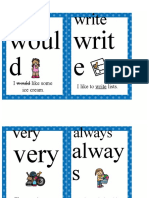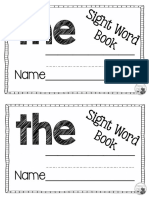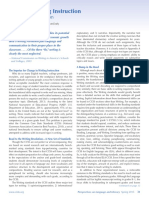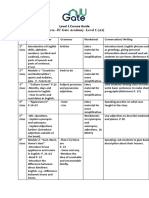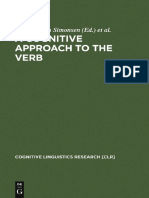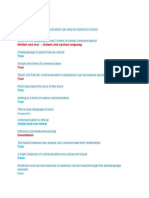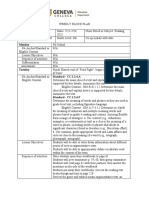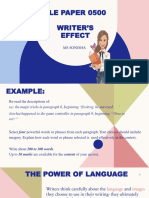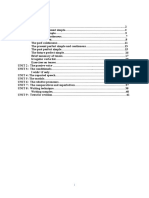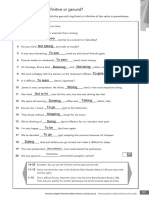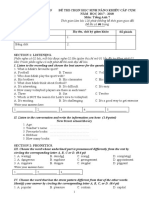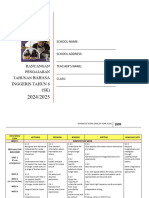Activities For Practising Spelling - Toxic To Helpful Lyn Stone
Activities For Practising Spelling - Toxic To Helpful Lyn Stone
Uploaded by
megbhicksOriginal Description:
Original Title
Copyright
Available Formats
Share this document
Did you find this document useful?
Is this content inappropriate?
Report this DocumentCopyright:
Available Formats
Activities For Practising Spelling - Toxic To Helpful Lyn Stone
Activities For Practising Spelling - Toxic To Helpful Lyn Stone
Uploaded by
megbhicksCopyright:
Available Formats
From the Bulletin
Learning Difficulties Australia
www.ldaustralia.org
Activities for Practising
LDA Bulletin | Activities for Practising Spelling – Toxic to Helpful
Spelling – Toxic to
Helpful
Based on many years correspondences and meaning-related activities to
considerations, as well as reflecting reinforce the
researching and practising the history of English borrowings from teaching of sets
spelling activities with other languages. Many teachers are of words and
struggling students, not confident about teaching spelling, orthographic
and unfortunately, spelling practice may patterns, once
Lyn Stone’s forthright well be the greatest victim of wasted they have had
suggestions about what opportunity in literacy instruction. The their phonemic
number of “spelling activities” available structure
really works, and maybe that do nothing to increase spelling explored,
more importantly what ability is astounding. and have
doesn’t, will provoke lively This article is about practising been defined, with their meaning
spelling, rather than about choosing components, including morphemes and
debate amongst those words to be taught or helping students root words, fully analysed. When literacy
trying to help children to to understand the meaning and teaching is not explicit, systematic,
become better spellers. phonemic and morphemic structure of direct, cumulative and structured, and
the words. does not include meaningful analysis
The Spelling Activities Scale, below, of the spelling words to be studied, the
is based on a collection I have made spelling practice activities outlined here
over the years of homework sheets will be characterised by a shorter helpful
that have been given to my children. arrow, with a corresponding increase in
I then placed them on a scale of merit, length of the longer, toxic arrow.
ranging from toxic, through useless and
then to helpful.
F
To determine the place of each
luent, accurate writing is an spelling practice activity on the scale, I
apex activity. It is one of the asked the question, “Will this improve/
most complicated things a reinforce a typically developing child’s
person can do. It requires the ability to spell?”.
creation and use of brain structures Before I go on, I’d like to stress
available only to humans, years of again that this article is about spelling
practice, and, if it is to be done well by practice – what teachers can do to help
all, it requires skilful teaching from the students consolidate what they have
outset. Within the set of skills needed been taught about the spelling of words,
for writing fluency, there is spelling, and reach a point of automaticity and
often not given its full due because it is fluency in spelling. There are several
regarded as a lower-order or mechanical critical aspects of literacy learning that
skill. When students do not learn are not on this scale; I take it that they
spelling easily, however, the difficulty go without saying. One such aspect
forms a bottleneck that often limits is the act of silent reading. Reading
the expression of higher-order writing increases exposure to words and
skills. The teaching challenge involved patterns and increases vocabulary
in helping these students to improve (Cunningham & Stanovich 2001). But it
their spelling is, in turn, surprisingly is not a spelling activity.
demanding. English spelling presents Even more importantly, explicit,
a host of challenges to both students systematic, direct, cumulative,
and teachers. It is a very complex structured teaching with a clear scope
system, and is essentially multi- and sequence is not on this scale either.
layered, reflecting intricate, context- It is, rather, taken as a sine qua non.
dependent patterns of sound-letter This Spelling Activities Scale refers to Figure 1. The Spelling Activities Scale
14 | Volume 50, No 2, Winter 2018
From the Bulletin
Learning Difficulties Australia
www.ldaustralia.org
Anything on the helpful part of the improve, thus rendering those activities me that activities promoting clusters of
LDA Bulletin | Activities for Practising Spelling – Toxic to Helpful
Spelling Activities Scale will have some toxic in the long term. consonants such as st- in stop or –nd in
positive, long-lasting effect. Anything on I daresay there are many more hand as single units are not linguistically
the useless part may have a temporary activities not mentioned, but the ones accurate and are the direct cause
effect, but offers nothing long-lasting or that make it into the helpful zone reading and spelling errors in too many
constituting a good use of learning time. involve processing words from left to cases. Some students who struggle
Useless strategies have about the same right, in the correct sequence, all the with the awareness of the separate
effect as cramming for an exam, which way through. Any activity that requires phonemes in a consonant cluster find it
gives them a temporary appearance of messing with letter sequences begins to very difficult to make sense of spelling
useful. Anything in the toxic area will slide into the useless/toxic zone. when the identity of the phonemes is not
help to instil poor habits in typically clarified for them.
developing children and will risk actually Toxic spelling activities
impeding the progress of those with We’ll start with the worst. At the Useless strategies have
learning difficulties. very bottom of the scale, and toxic about the same effect as
For some children, toxic activities to everybody, is the act of asking
also include those things that may students to look for words inside words,
cramming for an exam,
be helpful for others. For example, irrespective of whether they are linked which gives them a
spelling bees can be too confronting in meaning. This is not the same temporary appearance
and anxiety-causing for some children, as separating root words from their
and will fail to teach them anything affixes (e.g. play + -ing = playing), but
of useful
except to avoid school. instead, for example, getting them to
This brings us to word-coffins. This
In a similar vein, some activities spot the word sin in business or win in
is not a widely used term (because I just
deemed useless could actually prove throwing. It is simply irrelevant and not
coined it last week), but it is certainly
to be toxic for children with learning generalisable to any other words.
a widely used activity. This is where
difficulties. These children need to Then comes blends as units. I
children are directed to analyse words
spend their time doing things to improve have written about this extensively in
according to their shapes. They draw
their skills. Useless activities rob them a blog piece called Round the Blend,
boxes around them, or write words into
of crucial practice and opportunity to but in summary, my experience tells
pre-fabricated word boxes. This activity
is so devoid of anything resembling good
practice, it actually pains me to mention
it. I am not sure what theory it could
possibly be based on, except some
dreadful “visual” part of the baseless
3-cueing system. They are called
word-coffins because to me, those
boxes signal that high quality spelling
instruction is as dead as a doornail in
this classroom.
I’ve also heard of word-coffins being
referred to as Elkonin boxes, but they
are not the same thing. Daniil Elkonin,
a Russian-Soviet psychologist, would
no doubt have been very disappointed
to see his name applied to such a
dreadful activity. Elkonin boxes, which
Figure 2 Word-coffins
give a phonology-spelling framework,
are useful. The boxes are all the same
size, and each orthographic pattern
is represented within one box and
matched to the phoneme it represents.
The value of this task is to draw
students’ attention to the idea that there
are different phonemes in words which
can be isolated through careful listening
and awareness of the position of the lips,
tongue and teeth.
Bordering on useless for average
learners, but toxic for struggling
children, is the act of reducing words to
individual letters and cutting/jumbling
them up for reassembly. Placing
orthographic patterns in memory
requires exposure to the correct
Figure 3 Elkonin boxes sequence of letters (Ehri 2014). Messing
Volume 50, No 2, Winter 2018 | 15
From the Bulletin
Learning Difficulties Australia
www.ldaustralia.org
about with an incorrect sequence risks have 8 points etc. This may slightly fate, neigh, rain, steak, and obey all
LDA Bulletin | Activities for Practising Spelling – Toxic to Helpful
diminishing, not increasing, a child’s enhance the statistical learning aspect of at once is much too complex and the
memory for orthographic patterns. spelling (Arciuli & Simpson 2012), but words in these families often contain
Similarly, fill in the missing letter on such a small and painstaking scale other information that needs to be
exercises can be detrimental to that it’s hardly worth the bother. Regular explicitly taught.
struggling students, and for typically reading is far more likely to establish an I see hundreds of worksheets
developing students, I ask, “What’s the understanding of letter frequency, so based on rime/coda “word families”,
point? It is better to spend time reading why not do that? such as pan, man, can etc. This is a
and writing whole words than engaging We do have some pretty excellent waste of time, given that this type of
in no-sequence, no-pattern busy work.” software that will create word search simple CVC pattern is relatively easy
Alphabetising lists of words is puzzles at the push of a button, and to perceive and represent. That is, it
great if you want to teach the order of for that, we can be thankful. But it’s is more efficient to learn the individual
the alphabet, but not much else. As a hardly an activity that places correct letters and sounds and combine these
spelling activity, it is generally useless, patterns into the orthographic lexicon to read and spell words than it is to also
and if relied upon too heavily, reinforces at any rate worth spending time on. learn combinations like ‘an’. If you know
the unhelpful habit of only paying However, searching for words in a word ‘a’ and ‘n’, then learning ‘an’ as a word
attention to the first letter of a word. search puzzle is a time-consuming family is superfluous. Worse still, are
activity that fails to cement the vast “families” based on a single letter,
Useless spelling orthographic lexicon efficiently. usually an initial consonant, like run,
right, ranunculus (okay, I exaggerated
activities I see flashcards being
the last one, but it might as well be on
recommended for helping with spelling,
Then we enter the great grey desert these lists, for all the good they do).
but I’ve yet to see how they could
of useless activities. They won’t really If you want your families to work,
possibly be useful. If you flash a word
harm anyone, but they won’t teach use close families, not random,
at a person, you are asking them to
much, if anything, about spelling. We sprawling ones. One example of a
memorise a word for reading, not for
begin with lists containing random words, close, useful family, is the group of nine
spelling. I know of no research study
some with affixes attached and some separate words that can be generated
that has shown whole word methods to
not. These can be toxic in the absence just by adding a different consonant
be superior to structured literacy in any
of explicit instruction in morphology. For to the word all (ball, call, fall, gall, hall,
aspect of learning to read and write.
example, a Google search for “Grade 3 mall, pall, tall and wall). They are often
Flashcards for spelling practice are of
spelling list” often yields something like misspelled, so I have them generated,
little use.
the following hotchpotch: defined, used in sentences and drilled
• why
• began
Moving towards useful as the all family and I usually see long-
term transfer to subsequent dictation
• parties activities… and composition pieces.
• being Colouring, circling or underlining Another useful word family is that of
• hopping vowels and consonants in words is the words with ‘wa’. It is useful to know that the
• beautiful first activity on the scale that requires letter <a> is affected by a preceding <w> in
• knight actual processing from left to right. It’s many words. This is what I call the w-effect.
Each one of these words could be used still a bit mindless, but we’re at last The letter <w> makes the <a> say /ɒ/,
as a gateway to understanding more getting somewhere, because the focus is such as in was, wash, want and wand. This
about English spelling, but instead, they on drawing student attention to syllable is a useful family for several reasons:
are lumped together as whole words, to structure and orthographic patterns, even • It contains many high-frequency
be crammed as an unrelated list and if the mechanics of circling or colouring words.
never to be used again. No pattern is are clumsy and time consuming. • It applies broadly.
learned that would help with the spelling Word families are terrific things… • It can be used to illustrate the vowel-
of similar words. No awareness is gained if planned and sequenced carefully in changing properties of <w> in other
of morphology or etymology. The task is a way that draws student attention to words (work, war etc.). I tell students
much harder than it need be and much learning that can be generalised. For to be suspicious if they see <w>
less effective than it could be. example, learning the ‘igh’ words (high, preceding <a> or <o>.
Next up is “rainbow writing” (writing tight, light) all at one time makes great Sometimes my students even get
a word using a different colour for every sense. Poorly conceptualised groupings inspired to illustrate the W Effect, like my
letter). It verges on the toxic because it that are based on limited teacher friend Douglas did quite dramatically in
is so prevalent, time-consuming and yet knowledge are confusing because they Figure 4 (in his own time, in addition to
so devoid of merit. Like jumbled letters, are not generalisable. For example, lied, his reading and spelling homework, not
it disguises orthographic patterns. tier and chief ought not be grouped in place of it).
Any activity that requires a child to use together. Each is based on a different
more than two colouring implements is orthographic pattern, and lumping
art, not literacy. these words together makes no sense to
Then there is the bizarre practice students. Likewise, putting nose, road
of assigning Scrabble word scores to and slow in the same ‘family’ doesn’t
spelling words. Each letter, due to its help students to understand which
frequency, has a certain score. The spelling of a particular phoneme should
letter <e>, being the most common, be chosen. Sometimes, the demands
has a score of 1, whereas <x> and <j> are even greater. Learning to spell play, Figure 4. W Effect picture
16 | Volume 50, No 2, Winter 2018
From the Bulletin
Learning Difficulties Australia
www.ldaustralia.org
The teaching of these families does often said with a collapsed syllable in the • Define and use each word in a
LDA Bulletin | Activities for Practising Spelling – Toxic to Helpful
not precede instruction in sound- middle, but I prefer just to say, “There’s sentence
symbol relationships and phonological a BRA in the library!” Not many forget it • Use the words in copied/dictated
processing, but is intended to be used after that. sentences and paragraphs.
as a bridge between phonology and • Have students compose sentences
orthography. The Top Five containing the words.
Sliding back down to the slightly The top five activities in the • Build up to hundreds of words
helpful area, practice tests are often countdown all require rapid recall and and practise drilling the columns
recommended as a spelling activity. writing. These, more than any other, will frequently.
They fall into a similar zone as the deliver the necessary practice in spelling If you give a list of spelling words to
“Look, say, cover, write, check” to improve long-term recall. a child to learn, that child has made an
catchphrase that is rampant in Five: Air/sky writing. I’ve been investment of time and cognitive effort. A
Australian schools. In isolation, these watching this activity emerge over return on that investment will only come
activities teach nothing except that the the years, and I must say, judiciously if the child has had enough exposure to
student is still wrong or hasn’t crammed used, it seems promising. This is when the word and enough practice writing
the words successfully. Perhaps as part children use their fingers to write their it, from start to finish, from left to right.
of a larger, more explicit, systematic target words in the air. It is important Too often, children are asked to make
sequence of teaching and learning, when doing this activity that students an investment for zero yield, and then
where students have the opportunity to always recite the words from the first are blamed for getting low scores in
self-correct and reflect on the patterns letter to the last rather than backwards, measures of spelling ability or for losing
they find difficult to remember, they for example. faith and motivation. On the other hand,
have some value. Four: Word families: I cannot stress if carefully and explicitly taught, and
Spelling bees are a somewhat enough the importance of grouping practised to mastery, spelling word lists
discriminatory, only really favouring words to be learned as a spelling focus can provide a self-extending treasure
the 1-2 exposure types who memorise into close, logical families. This can be trove that lasts a lifetime.
words easily, but if done cooperatively done along orthographic, etymological
and in teams, where everyone who or morphological lines (and those lines Lyn Stone is a linguist and literacy
wants to participate gets a turn, they can often overlap). and language specialist. She is a
be quite good practice. Three: Copying. Copying words, regular contributor to the Australian
Practising spelling through letter- sentences and paragraphs is a great way print and radio media on linguistics
naming whilst being engaged in a not only to practise fluency and spelling, as it relates to education and has
physical activity makes some sense, using a scaffolded, stable framework, but been featured many times on ABC
if the words are directly and explicitly if used purposefully, can also enhance Radio and Fairfax media, talking about
taught first. There is always something everything else that constitutes writing. spelling, grammar and dyslexia. Lyn’s
be gained from practice, and it might be Two: Dictation is slightly harder, in two flagship programmes, Spelling for
a bonus that this type of practice is more that students have to use their memory Life and Language for Life have been
appealing to some students than just for spelling and writing conventions. implemented in schools with excellent
sitting. It is a form of drilling, and if drills It is doubly useful to copy and dictate results for over a decade and have
can be fun without distracting from the sentences and paragraphs using been published by Routledge as two
purpose, there is no harm in that. explicitly taught words. books. Her new book, Reading for Life
Using mnemonics (memory hooks) One: Drilling: At the very top we will be released on December 20th
for selected words is helpful, if used have drilling. Yep, good old drilling. Old- 2018.
appropriately. It is tempting to try and rely fashioned, old-school, back-to-basics,
too heavily on mnemonics, so my rule of traditional drilling. I don’t care what names References
thumb is that if a word can be sounded are thrown at me for recommending this, Arciuli, J. & Simpson, I.C. (2012).
out using the child’s store of known and neither does any teacher/practitioner Statistical learning is related to
patterns, a mnemonic is a waste of time. worth their salt. By drilling, I mean going reading ability in children and adults,
Mnemonics come down to personal over and over an expanding list of words. Cognitive Science, 36, 286–304, DOI:
preference and teacher knowledge, Here’s a simple procedure: 10.1111/j.1551-6709.2011.01200.x
but I urge caution when applying them • Harvest words from written Cunningham, E. A. & Stanovich, K.
too liberally. A strange example of this compositions by students, focusing (2001). What reading does for the mind.
is teaching a mnemonic for the word on words that are misspelled American Educator, 22(1-2), 8-15.
geography. I have seen it presented as • Model the spelling of each word
Ehri, L.C. (2014) Orthographic
“George’s elderly old grandfather rode a and have students write them in
mapping in the acquisition of sight
pig home yesterday.” The opportunity to columns.
word reading, spelling memory,
teach three very useful morphemes, geo-, • Have students indicate, through
-graph- and –y would be lost in favour of a simple marking system, e.g. and vocabulary learning, Scientific
a nonsensical sentence. underlining digraphs, placing a Studies of Reading, 18:1, 5-21, DOI:
Having said that, one of my favourite cross underneath silent letters etc., 10.1080/10888438.2013.819356
mnemonics is for library. I could teach the parts that they need to pay most
students that the word library comes attention to. Place them in families
from libr, meaning “book” and that libr is containing similar difficult parts.
thought to be in the same etymological • Drill the words, first by sounding
family as leaf, or that it has a noun- each phoneme and then by saying
forming suffix: –ary, or even that it is the whole word.
Volume 50, No 2, Winter 2018 | 17
You might also like
- The Mitten by Jan BrettDocument3 pagesThe Mitten by Jan BrettlamecebiNoch keine Bewertungen
- MMPhRdrs Set 1 PDFDocument29 pagesMMPhRdrs Set 1 PDFVvs SadanNoch keine Bewertungen
- The Day The Crayons Quit: Jaime LockeDocument12 pagesThe Day The Crayons Quit: Jaime LockeMárcia DiasNoch keine Bewertungen
- Consonant Blends SentencesDocument198 pagesConsonant Blends SentencesALLELI FAITH LEYRITANANoch keine Bewertungen
- Early Reading 10 - The Dog in The WellDocument6 pagesEarly Reading 10 - The Dog in The WellRadaNoch keine Bewertungen
- 2nd Grade Decodable Readers Units 3-4 CBDocument20 pages2nd Grade Decodable Readers Units 3-4 CBpqr10% (1)
- Reading Comprehension Sight Words Part 3 PDFDocument11 pagesReading Comprehension Sight Words Part 3 PDFCris Cristina100% (1)
- Key Connective ActionsDocument2 pagesKey Connective ActionssarahNoch keine Bewertungen
- Turk and Runt Word CardsDocument1 pageTurk and Runt Word Cardsapi-292747797Noch keine Bewertungen
- Smarter Phonic : Book 2: A Big Pig or Mig Props For Book 2 Story - Wig, MusicDocument1 pageSmarter Phonic : Book 2: A Big Pig or Mig Props For Book 2 Story - Wig, MusicKing GilgameshNoch keine Bewertungen
- Phonemic Awareness: Phoneme MatchingDocument7 pagesPhonemic Awareness: Phoneme Matchingapi-310328489Noch keine Bewertungen
- Guide Reading Level - Grade1Document8 pagesGuide Reading Level - Grade1EndiNoch keine Bewertungen
- 2-3pa 2Document6 pages2-3pa 2api-280472280Noch keine Bewertungen
- Word Families PoemsDocument104 pagesWord Families Poemsphu.nguyenmaterials100% (1)
- MYP Writing RubricDocument2 pagesMYP Writing RubricstepintoourclassroomNoch keine Bewertungen
- Letters AND Sound: 2 GradeDocument20 pagesLetters AND Sound: 2 GradeMarlenNoch keine Bewertungen
- Selection Comprehension: 1. How Can Readers Tell That "Two Bear Cubs" Is A Play?Document12 pagesSelection Comprehension: 1. How Can Readers Tell That "Two Bear Cubs" Is A Play?Dominic FatinikunNoch keine Bewertungen
- Grade 2 Reading Oi and Oy WorksheetDocument1 pageGrade 2 Reading Oi and Oy WorksheetDanielle Elish GocoNoch keine Bewertungen
- Dudu's DreamDocument28 pagesDudu's Dreamtutorial 001Noch keine Bewertungen
- OPW PPT L3 - U1 - Lesson1Document25 pagesOPW PPT L3 - U1 - Lesson1liuliagnNoch keine Bewertungen
- French Morning WorkDocument24 pagesFrench Morning WorkhongNoch keine Bewertungen
- Raz ld16 Themitten SampDocument8 pagesRaz ld16 Themitten SampzanaNoch keine Bewertungen
- The Relatives Came-Cover SheetDocument2 pagesThe Relatives Came-Cover Sheetapi-408279529Noch keine Bewertungen
- Getting Around The CityDocument12 pagesGetting Around The CityNguyễn Anh MinhNoch keine Bewertungen
- Tips To Build Phonological AwarenessDocument2 pagesTips To Build Phonological AwarenessNicole FischerNoch keine Bewertungen
- 2-3phonics 4Document56 pages2-3phonics 4api-269994961Noch keine Bewertungen
- Reading Rods Blends R Book Level 1Document4 pagesReading Rods Blends R Book Level 1Francisco Veron CruzNoch keine Bewertungen
- WileyBlevins PhonicsDocument6 pagesWileyBlevins Phonicsamurray100% (1)
- Letters Vowels Consonants: My Name Has My Name Has My Name HasDocument2 pagesLetters Vowels Consonants: My Name Has My Name Has My Name HasALINE CORDEIRONoch keine Bewertungen
- Word Family Part 3Document19 pagesWord Family Part 3CharleneNoch keine Bewertungen
- Word Family Reading CardsDocument38 pagesWord Family Reading CardsAfiqah ZainalNoch keine Bewertungen
- (B卷) III-2 被動語態解答Document2 pages(B卷) III-2 被動語態解答Claire Chen100% (1)
- Ē Word Families: The ChunkDocument10 pagesĒ Word Families: The ChunkКсения СкрыльNoch keine Bewertungen
- Goodnight, Goodnight Construction Site Series Teacher GuideDocument4 pagesGoodnight, Goodnight Construction Site Series Teacher GuideChronicleBooksNoch keine Bewertungen
- Decodable Book Directions-4 1 1 1 - 3-6Document3 pagesDecodable Book Directions-4 1 1 1 - 3-6api-479279934Noch keine Bewertungen
- Short Vowel /uDocument8 pagesShort Vowel /uyousraNoch keine Bewertungen
- sn1 040120 Mowillems Skill PrintableDocument1 pagesn1 040120 Mowillems Skill Printableapi-233717707Noch keine Bewertungen
- Draw Elephant Gerald in 6 Steps!Document2 pagesDraw Elephant Gerald in 6 Steps!IVANANoch keine Bewertungen
- Wiley Blevins (US Phonics Guru) PDFDocument99 pagesWiley Blevins (US Phonics Guru) PDFKid Dirt100% (2)
- Foundations Decodables KDocument67 pagesFoundations Decodables KThei12Noch keine Bewertungen
- Decode Teaching Notes st5Document12 pagesDecode Teaching Notes st5Jiang TaoNoch keine Bewertungen
- Itsy Bitsy Spider Storia TGDocument8 pagesItsy Bitsy Spider Storia TGKathya Soto BNoch keine Bewertungen
- Summer Fun Reading ActivitiesDocument35 pagesSummer Fun Reading Activitiesjanettagraham100% (2)
- JunglePhonics1 TG PDFDocument8 pagesJunglePhonics1 TG PDFSailaja JayamaniNoch keine Bewertungen
- Sight Words 2nd GradeDocument26 pagesSight Words 2nd GradeHelenNoch keine Bewertungen
- A Nap and A Map: AnapandamapDocument5 pagesA Nap and A Map: AnapandamapBakke Na BakkeNoch keine Bewertungen
- SHCHTHWHPH: WWW - Englishsafari.inDocument7 pagesSHCHTHWHPH: WWW - Englishsafari.inElvis AungNoch keine Bewertungen
- Blast Off! With Guided Reading!Document13 pagesBlast Off! With Guided Reading!ChuahgegeNoch keine Bewertungen
- Letter WW Newsletter April 17-21 2016Document1 pageLetter WW Newsletter April 17-21 2016Rosie Guerra-HuntNoch keine Bewertungen
- (B卷) III-2 被動語態Document2 pages(B卷) III-2 被動語態Claire ChenNoch keine Bewertungen
- Reading Grade KDocument34 pagesReading Grade KSara LahouassaNoch keine Bewertungen
- GoGo Phonics4 SampleDocument13 pagesGoGo Phonics4 SampleMatthew Wong100% (1)
- Final Blends: ND, NG, NK, NT, FT, XT, MPDocument11 pagesFinal Blends: ND, NG, NK, NT, FT, XT, MPBendaña KHayeNoch keine Bewertungen
- Lesson Plan 1Document2 pagesLesson Plan 1api-339560081Noch keine Bewertungen
- Early Reading 13 Hog and The DogDocument6 pagesEarly Reading 13 Hog and The DogDessirae100% (1)
- Sight Word BooktheDocument14 pagesSight Word BooktheKannybell Belle100% (1)
- Mr. Wuffles Discussion GuideDocument4 pagesMr. Wuffles Discussion GuideHoughton Mifflin Harcourt100% (1)
- The Napping House - BOOKDocument29 pagesThe Napping House - BOOKAlicia20 AguirreNoch keine Bewertungen
- Listening Comprehension TestDocument7 pagesListening Comprehension Testapi-404199160Noch keine Bewertungen
- Simple Machines PosterDocument1 pageSimple Machines PostermegbhicksNoch keine Bewertungen
- DIY Helicopter LauncherDocument1 pageDIY Helicopter LaunchermegbhicksNoch keine Bewertungen
- Effective Writing by Judith HochmanDocument7 pagesEffective Writing by Judith HochmanmegbhicksNoch keine Bewertungen
- Key To Percents 3Document48 pagesKey To Percents 3megbhicksNoch keine Bewertungen
- Level 1 Guide - DEVELOPEDDocument3 pagesLevel 1 Guide - DEVELOPEDahmadjoe04Noch keine Bewertungen
- English (2.5) Count and Mass NounsDocument5 pagesEnglish (2.5) Count and Mass NounsGenevieve MelgazoNoch keine Bewertungen
- 3 Normal and Inverted Word OrderDocument40 pages3 Normal and Inverted Word OrderDINDO AzucenaNoch keine Bewertungen
- Barthes-What Is CriticismDocument4 pagesBarthes-What Is CriticismFathia Rahma DewiNoch keine Bewertungen
- UntitledDocument321 pagesUntitled谷光生Noch keine Bewertungen
- The Sound Symbolism of Names: David M. Sidhu and Penny M. PexmanDocument5 pagesThe Sound Symbolism of Names: David M. Sidhu and Penny M. PexmanQIAN RU FOONoch keine Bewertungen
- GR 11 EappDocument66 pagesGR 11 EappMarkhill Aquinde91% (11)
- Life 2e AmE SB2 Scope and SequenceDocument2 pagesLife 2e AmE SB2 Scope and SequenceSophia VargasNoch keine Bewertungen
- How To Write A PrécisDocument6 pagesHow To Write A PrécisKimberly De Vera-AbonNoch keine Bewertungen
- Tugas Pertemuan 12 - B.inggrisDocument4 pagesTugas Pertemuan 12 - B.inggrisBagus Al RasyidNoch keine Bewertungen
- Eng101 Final Term Solved Papers by FaheemDocument43 pagesEng101 Final Term Solved Papers by FaheemShehryar Ali KhiljiNoch keine Bewertungen
- 9th English Lesson PlansDocument22 pages9th English Lesson PlansSESHA GIRI PVNoch keine Bewertungen
- Joe Beck Cald TalkDocument42 pagesJoe Beck Cald TalkDee DeeNoch keine Bewertungen
- A New Kind of Corn Story UnitDocument5 pagesA New Kind of Corn Story Unitapi-610422398Noch keine Bewertungen
- Primary Path L5 WBDocument12 pagesPrimary Path L5 WBibtsammahmoud701100% (1)
- PhoneticsDocument56 pagesPhoneticsAnushka Chittora100% (1)
- NounsDocument18 pagesNounsSHAIRA JOY NAÑEZNoch keine Bewertungen
- 7C's of Communication (M3-OL2)Document17 pages7C's of Communication (M3-OL2)Harley Ned AquinoNoch keine Bewertungen
- Egra G3 2022 2023Document2 pagesEgra G3 2022 2023Dang-dang QueNoch keine Bewertungen
- Writers EffectDocument23 pagesWriters EffectNisha Johanthan100% (1)
- UntitledDocument50 pagesUntitledMeriem EzzhareNoch keine Bewertungen
- Subordinating ConjunctionsDocument12 pagesSubordinating ConjunctionsBrenda Ting StNoch keine Bewertungen
- AEF3e Level 2 TG PCM Grammar 7BDocument1 pageAEF3e Level 2 TG PCM Grammar 7BAlejandro Ramos LopezNoch keine Bewertungen
- Business English at Work: © 2003 Glencoe/Mcgraw-HillDocument41 pagesBusiness English at Work: © 2003 Glencoe/Mcgraw-HillSelfhelNoch keine Bewertungen
- Anh 7 Cum 4 (2017-2018)Document8 pagesAnh 7 Cum 4 (2017-2018)thuybonginNoch keine Bewertungen
- RPT ENGLISH YEAR 6 (SK) 2024-2025 by RozayusAcademyDocument13 pagesRPT ENGLISH YEAR 6 (SK) 2024-2025 by RozayusAcademyFelix JosephNoch keine Bewertungen
- 3third Conditional - ExercisesDocument2 pages3third Conditional - ExercisesEmil EkNoch keine Bewertungen
- Grade 4 Language Handout Term 3Document22 pagesGrade 4 Language Handout Term 3Elginette KassimNoch keine Bewertungen
- DLL - English 4 - Q2 - W8Document5 pagesDLL - English 4 - Q2 - W8Ivy PacateNoch keine Bewertungen
- TO 4 BUMN 2023 Bahasa Inggris StructureDocument5 pagesTO 4 BUMN 2023 Bahasa Inggris StructureDenny ArdianNoch keine Bewertungen

